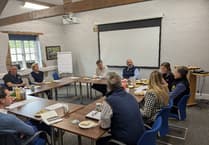THE service at Crediton Methodist Church on Sunday, August 20 was arranged by the worship team and led by Cathy Jerrard.
The reading from Genesis told the story of Joseph.
Hilary gave a synopsis of the story in previous chapters telling how Joseph was sold into slavery by his brothers and how he eventually became Pharaoh’s right-hand man.
It was 22 years later when his brothers went to Egypt to buy grain, following the famine in Canaan.
Joseph recognised them immediately although they did not recognise him as he would have become quite “Egyptionised”.
Cathy asked how we would feel if we bumped into someone who had treated us badly.
Joseph’s first reaction was to accuse them of being spies and he threw them into prison for three days.
Maybe he did this to give himself time to work out what to do.
Perhaps sending them back to Canaan to fetch Benjamin and the games with the sacks was partly to test them, to see if there was any change of heart.
When they returned to Egypt Joseph sent everyone else out of the room and identified himself to his brothers and dramatically forgave them.
There was much hugging and sobbing and emotion.
Cathy said that “Forgive your enemies” was a clear command from Jesus who gave His life that we might be forgiven all the wrongs we have ever said, thought or done and the expectation is that we forgive those who have wronged us.
In Colossians Paul says “Make allowance for each other’s faults and forgive anyone who offends you. Remember the Lord forgave you, so you must forgive others”.
Corrie ten Boom and her sister Betsie were arrested for concealing Jews during the Nazi occupation of Holland.
They were sent to Ravensbruck Concentration Camp where Betsie died.
In 1947 Corrie was speaking in a church in Munich when she saw a man who had been a guard at Ravensbruck.
He went up to Corrie and explained he had become a Christian and said he knew that God had forgiven him but he asked for her forgiveness.
Corrie felt she could not forgive him for the death of her sister but knew that “God forgives” has a condition – that we forgive too.
She silently prayed “Jesus help me” and woodenly thrust her hand into his. As she did, an incredible thing happened and healing warmth seemed to flood her whole being. She forgave the man with her whole heart.
Cathy asked if there are relationships which are broken and there remains unforgiveness in our hearts.
If so, we are in good company as Joseph and Corrie ten Boom and countless others have wrestled with that same challenge.
Unforgiveness destroys relationships and causes conflicts.
Forgiveness is the key that unlocks the door of resentment and the handcuffs of hate.
It is a power that breaks the chains of bitterness.
Forgiveness is essential whether or not there is opportunity for reconciliation.
There is a second thing to take away from this story – God takes the bad stuff that happens, that other people do to us, and turns it to good.
Joseph had to wrestle to forgive his brothers, but Joseph had clearly grown to love and serve God.
The remarkable thing is that Joseph, who had endured 13 years of slavery and prison, could say this: “Don’t worry or blame yourselves for what you did.
“God is the one who sent me ahead of you to save lives … After all, you were not really the ones who sent me here – it was God.
“He made me the highest official in the king’s court and placed me over all Egypt”.
Everything that happens to us – good and bad - is all part of God’s plan to bring good out of evil.
Even more so when Jesus was arrested and suffered the most horrendous death so that our wrongdoing might be forgiven.
Both were hideous travesties of justice, but God brought glorious victory, forgiveness and peace.
Bronwyn Nott




Comments
This article has no comments yet. Be the first to leave a comment.